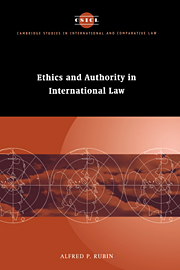Book contents
- Frontmatter
- Contents
- Preface
- Acknowledgments
- List of abbreviations
- Table of cases
- Table of statutes
- Table of treaties
- 1 Introduction
- 2 The international legal order
- 3 Theory and practice come together
- 4 Putting it together
- 5 Implications for today
- Bibliography
- Index
- CAMBRIDGE STUDIES IN INTERNATIONAL AND COMPARATIVE LAW
2 - The international legal order
Published online by Cambridge University Press: 14 September 2009
- Frontmatter
- Contents
- Preface
- Acknowledgments
- List of abbreviations
- Table of cases
- Table of statutes
- Table of treaties
- 1 Introduction
- 2 The international legal order
- 3 Theory and practice come together
- 4 Putting it together
- 5 Implications for today
- Bibliography
- Index
- CAMBRIDGE STUDIES IN INTERNATIONAL AND COMPARATIVE LAW
Summary
Introduction
The international legal order has its own complex history and traditions; its own legislative process; its own reflections of the conceptual antagonism between those who find “natural law” and those who find “positive law” models to be more congenial. As noted in the tale of Wen-Amon, recited above, the antagonism surfaces with the first known records of legal discussion. In its current form, however, it is not necessary to trace the tensions back further than the rejection of universal divine law theory in Europe and the intellectual restructuring of the system after the Peace of Westphalia in 1648. This reordering actually was a resurfacing of conceptions that had never wholly been lost since the days of Wen-Amon, although overlaid by various imperial and divine law theories. The division of divine law into positivism and secular amorality on the one hand, and “morality” on the other, can be fairly easily seen in the events of the early sixteenth century, when the rulers of Spain and Portugal found ways to by-pass the authority of the Pope in dividing between the two of them the “rights” that flowed by secular conquest in the Western Hemisphere and the trading points South and East of the Azores.
- Type
- Chapter
- Information
- Ethics and Authority in International Law , pp. 35 - 69Publisher: Cambridge University PressPrint publication year: 1997

